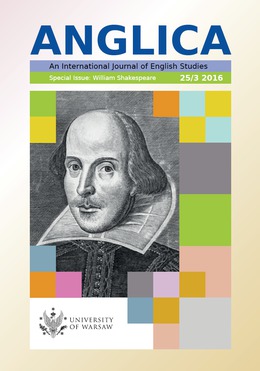Andrzej Wajda’s Two Hamlets and One Macbeth: The Director’s Struggle with Shakespearean Tragedy in the Changing Contexts of Polish History
Andrzej Wajda’s Two Hamlets and One Macbeth: The Director’s Struggle with Shakespearean Tragedy in the Changing Contexts of Polish History
Author(s): Jacek FabiszakSubject(s): Language and Literature Studies, Fine Arts / Performing Arts, Film / Cinema / Cinematography
Published by: Instytut Anglistyki Uniwersytetu Warszawskiego
Keywords: William Shakespeare;Hamlet;Macbeth;Andrzej Wajda;Polish theatre;
Summary/Abstract: Andrzej Wajda is a renown Polish theatre and fi lm director, whose achievements have been recognised by theatre and fi lm artists and critics all over the world (he has been awarded an Oscar). He has directed four versions of Hamlet and two versions of Macbeth (one for Polish television in 1969, the other for the Stary Theatre in Kraków in 2004). I propose to look at three productions to trace Wajda’s evolution in his approach to Shakespearean tragedy: Hamlet III, scenes of which were first staged in the Royal Castle of Wawel in Cracow, and then at the Stary Theatre in 1981. It was a Hamlet which addressed significant Polish problems (Wawel being a symbol of Poland, its historical power, the seat of the powerful Jagiellonian dynasty). The context of the production is also very significant: the time of the Solidarity festival, as it is now called in Poland (on 13 December 1981 martial law was introduced in Poland), so the performance could not help avoiding political issues. The director’s next take at Hamlet (his fourth attempt) occurred in 1989, another critical year in the Polish post-war history; surprisingly enough, the production was not so much Poland-oriented or politically involved as the previous version; instead Wajda poses questions about the condition of theatre in Poland and anticipates a less pressing need for politicising theatrical performances in the years to come. His Macbeth in turn was produced at the time of Poland’s engagement in the war on terrorism in Iraq; modern war of the ‘civilised world’ becomes a most signifi cant frame for the production, but not the only one. The performance, showing the Macbeths as an elderly couple who are confronted with possibly the last chance to make a diff erence in their life, touches upon both getting old and a long-term marriage.
Journal: ANGLICA - An International Journal of English Studies
- Issue Year: 25/2016
- Issue No: 3
- Page Range: 97-106
- Page Count: 10
- Language: English

